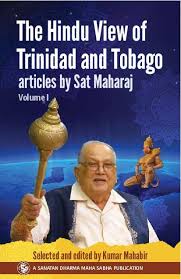Contribute
| Book Review: The Hindu View Of Trinidad And Tobago |
Ravi Dev
06/20/2016
Sat Maharaj: An Indian
​​
Intellectual Warrior in the Caribbean​ ​
The Hindu View of Trinidad and Tobago: Articles by Sat Maharaj
Selected and edited by Dr. Kumar Mahabir
2016. xii + 352 pages. ISBN 978-976-8260-70-3
5½ x 8½ inches. Paperback.
This collection of articles written over two decades by Sat Maharaj, General Secretary of the Sanatan Dharma Maha Sabha (SDMS) of Trinidad and Tobago, is an invaluable archive of reflections on the condition of Indians, and the Hindu community in particular. The articles selected begin in 1996, one year after Basdeo Panday, the first individual of Indian (and Hindu) origin, became Prime Minister, exactly 150 years after the arrival of Indians to Trinidad and Tobago.
The articles are seminal in that they offer an insight into the Hindu view of the “intellectual†and his role in society. To some, it may be anomalous to categorize Sat as an “intellectual,†but that is because we have been conditioned by a western perspective that believes that the intellectual is a “man of words†as opposed to “a man of action,†as Eric Hoffer did in The True Believer (1951).
In Hindu epistemology, knowledge does not arrive out of merely listening and cogitating upon ideas (as is the case in the western paradigm), but putting those ideas into action so that they can be tested for its validity as “living truth.†In this sense, Sat is that Hindu intellectual, who through his praxis, is an embodiment of epistemological ethical truths that resonate in the community he represents.
From a sociological perspective, Sat is reacting to the wider phenomenon of the exclusion of the Indian from the discourse of “national†intellectual concerns. As Professor Gordon Lewis of the University of the West Indies (UWI) pontifically pointed out, there were three main intellectual currents that swept the Caribbean in the 20th century: Marxism-Leninism, anti-colonialism, and Pan Africanism/Black Power/Negritude. The intellectual currents in the Indian community, which forms 20% of the overall Caribbean and 40% in the Southern Caribbean countries of Trinidad and Tobago, Guyana and Suriname, did not count, and so was not worthy of comment.
Bhadase's efforts were geared towards “giving Indians pride†but his effectiveness and his success that was organically built from the ground up, were undermined by the “intellectual snobbery†that insisted on the exclusion of Indian forms of knowledge and achievements.
In the resulting dominance of what was dubbed “Doctor Politics†and commentary, none of the “Indian doctors†had the intellectual dexterity to weave Indian concerns within an overarching ideology that incorporated their worldview to interrogate the dominant intellectual currents… until Sat Maharaj.
In the first attempt to counter the exclusionary “intellectualism†of Williams et al, Indians of Trinidad and Tobago replaced Bhadase with Dr Rudranath Capildeo who had a doctorate in Mathematics and an insistence to lecture in London. Capildeo failed, unlike Sat who refused to fall into the trap of assuming the premises of the dominant worldview were valid.
The Hindu View of Trinidad and Tobago: Articles by Sat Maharaj must be seen as a response to and a deconstruction of the Williams inheritance. While Sat did not follow Bhadase into organised politics in the party that Bhadase had formed (People's Democratic Party), he remained true to his position that Hinduism was not a cribbed “religion†but an all-encompassing way of life or “Dharma.†Sat's commentaries encompass the gamut of his constituency's life - including politics.
The 108 articles selected and edited by Dr. Kumar Mahabir - the number is obviously chosen because of the significance of that number in Hinduism, epitomized by constituting the number of beads on the prayer “mala†- were grouped in seven categories: Politics, Education, History, Icons, Culture, Religion, Society and SDMS.
Sat demonstrated that the anti-Hindu position of the PNM was not just expressed in snide comments but was buried in the structural underpinnings of the society to continually perpetuate the suppression of Indians. “Even a reformed PNM under Patrick Manning continued to discriminate against the Indians, in particular, the Hindu community. Remember the Sanatan Dharma Maha Sabha Radio license case?
The Maha Sabha was refused a radio frequency by the Patrick Manning Administration whilst a radio license was granted to a major supporter and financier of the PNM in the quickest possible time. What followed was years of legal battles going all the way to the Privy Council. On July 4th 2006, in a landmark 19-page judgment, Lord Mance of the Privy Council said, “In light of the exceptional circumstances†of the discrimination, the Privy Council would order Attorney General John Jeremie to do all that is necessary to ensure that a license is issued forthwith to the Hindu organization.â€
The judgment in favor of the Maha Sabha was unanimous, yet the PNM administration refused to comply with the judgment of the Privy Council. Only when the government was threatened with further legal action, the radio frequency was granted in September 2006.
It is these structural conditions that Sat has been strenuously exposing for over half a century in his columns and in every forum that his position as the head of the largest Hindu organization in the Caribbean opened up to him. He has even gone further by taking concrete action in the courts.
(Ravi Dev is a New York attorney who returned to Guyana in 1989 as an Indian civil rights activist. Like Sat Maharaj, he has been a columnist in several Guyanese newspapers since 1990 and had written prolifically on history, politics, religion, society and culture. )
You may also access this article through our web-site http://www.lokvani.com/
